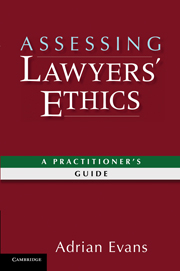Book contents
- Frontmatter
- Contents
- Preface
- List of figures
- Acknowledgements
- 1 An opportunity for law societies
- 2 Ethical failures, research and core qualities
- 3 Understanding ethical methods and types
- 4 Mechanisms to offset business pressure on legal ethics
- 5 Discovering practitioners' opinions about ethics assessment and psychological testing for integrity
- 6 Developing character
- 7 Measuring awareness of values and ethics
- 8 Entrenching ethics assessment
- Appendix A Research methods
- Appendix B Awareness of ethical type
- Appendix C Prototype scale of preference for legal ethical type
- Index
2 - Ethical failures, research and core qualities
Published online by Cambridge University Press: 10 January 2011
- Frontmatter
- Contents
- Preface
- List of figures
- Acknowledgements
- 1 An opportunity for law societies
- 2 Ethical failures, research and core qualities
- 3 Understanding ethical methods and types
- 4 Mechanisms to offset business pressure on legal ethics
- 5 Discovering practitioners' opinions about ethics assessment and psychological testing for integrity
- 6 Developing character
- 7 Measuring awareness of values and ethics
- 8 Entrenching ethics assessment
- Appendix A Research methods
- Appendix B Awareness of ethical type
- Appendix C Prototype scale of preference for legal ethical type
- Index
Summary
Education without assessment is wasted effort
The experience of the community, clients and courts with lawyers' ethics is unfortunately biased because of the reality that ‘good news is no news’ and correspondingly, bad cases are remembered. Law societies and bar associations have always faced an uphill battle to deal with public perceptions that lawyers' ethics are in disrepair. No amount of professional effort to the contrary seems to shift this perception, even when there are attempts to convey the same message in the most ‘feel-good’ area of lawyers' professional activity: through the acknowledgement and publicity of lawyers' often considerable pro bono activity.
Efforts to improve ethics might therefore meet the comment from some lawyers that there is little point in such initiatives because public attitudes to lawyers will always be cynical. This observation is probably accurate but does not deal with two other realities: that independent of public perceptions, ethical functioning needs to improve and lack of improvement will prepare the way for greater regulatory intervention by government. This is not to say that there is ‘no’ activity directed at improving legal ethics, just that it is insufficient. As a 2007 symposium at Georgetown University heard, the last 20 years have seen many initiatives in academic legal ethics education: more teachers involved and better materials, followed by continuing legal ethics education, more insightful bar association discussion about ethical complexity, better coverage in the legal press, the appointment of intra-firm ethics partners and especially, more consistent judicial comment on the lack of ethical standards in particular cases.
- Type
- Chapter
- Information
- Assessing Lawyers' EthicsA Practitioners' Guide, pp. 20 - 61Publisher: Cambridge University PressPrint publication year: 2010



